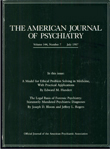Ethics in Forensic Psychiatry
TO THE EDITOR: We wish to commend Paul S. Appelbaum, M.D., for his scholarly editorial (1) on the incompatibility of clinical and forensic functions and for his endorsement of the conclusion of Strasburger et al. (2) that the problems which surround a therapist's assumption of the dual role of treater and (forensic) evaluator argue for its avoidance when~ever possible.
We take strong issue, however, with Dr. Appelbaum's implying that forensic psychiatrists are necessarily exempt from the canons of ethics embodied in the American Psychiatric Association's Principles of Medical Ethics, With Annotations Especially Applicable to Psychiatry (3). Citing his presidential address before the American Academy of Psychiatry and the Law (4) he writes, “Forensic psychiatrists, however, work in an entirely different ethical framework, one built around the legitimate needs of the justice system.”
Dr. Appelbaum elsewhere reminds us that forensic psychiatrists who conduct evaluations for legal purposes “do not enter into a physician-patient relationship” and correctly notes that “were forensic psychiatrists to be charged with pursuing subjects' best interests and avoiding harm—like their clinical colleagues—their evaluations would be worthless in the courts” (5). Obviously, on the basis of their training, psychiatrists have more to offer society than a physician-patient relationship. Nonetheless, Dr. Appelbaum overlooks the fact that the sole reason forensic psychiatrists are invited to testify in court is that they are psychiatrists, not administrators of or agents for justice.
Dr. Appelbaum fails to give a necessary warning that there are limits to the overriding goal of the forensic psychiatrist's professional activity to advance the interests of justice. One such limit, we insist, is the mandate of our ethical code that “a psychiatrist should not be a participant in a legally authorized execution” (3, section 1, paragraph 4). It is our contention that evaluating death row inmates for competency to be executed, given the fact that psychiatric testimony in this regard may prove to be the decisive factor in effectuating the prisoner's death, violates this ethical canon.
Not only forensic psychiatrists, but all psychiatrists, must remain constantly alert to the danger of being drawn into unethical conduct in the service of an elusive and not infrequently unjust “justice.” Have we forgotten our condemnation of the Soviet forensic psychiatrists who, in their zeal to advance the interests of “justice,” facilitated the unjustified hospitalization of political dissidents?
In articles recently published in the New York Law School Law Review (6) and The Wayne Law Review (7) we discuss at great length our differences with Dr. Appelbaum's position on what constitutes ethical practice in certain areas of forensic psychiatry.
1 Appelbaum PS: Ethics in evolution: the incompatibility of clinical and forensic functions (editorial). Am J Psychiatry 1997; 154:445–446Link, Google Scholar
2 Strasburger LH, Gutheil TG, Brodsky A: On wearing two hats: role conflict in serving as both psychotherapist and expert witness. Am J Psychiatry 1997; 154:448–456Link, Google Scholar
3 American Psychiatric Association: Principles of Medical Ethics, With Annotations Especially Applicable to Psychiatry. Washington, DC, APA, 1995Google Scholar
4 Appelbaum PS: A theory of ethics for forensic psychiatry: presidential address, in Abstracts of the 27th Annual Meeting of the American Academy of Psychiatry and the Law. Bloomfield, Conn, AAPL, 1996Google Scholar
5 Forensic psychiatrists need unique ethics rules. Psychiatr News, Nov 15, 1996, pp 1, 30Google Scholar
6 Freedman AM, Halpern AL: The erosion of ethics and morality in medicine: physician participation in legal executions in the United States. New York Law School Law Review 1996; 41:169–188Medline, Google Scholar
7 Schoenholtz JC, Freedman AM, Halpern AL: The “legal” abuse of physicians in deaths in the United States: the erosion of ethics and morality in medicine. The Wayne Law Review 1996; 42:1505–1601Medline, Google Scholar



